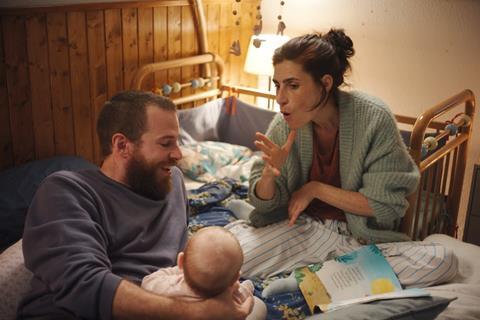Eva Libertad’s thoughtful feature stars her sister, Miram Garlo

Dir/scr: Eva Libertad. Spain. 2024. 99mins.
The arrival of a new baby puts a strain on the relationship between a deaf woman and her hearing boyfriend in Eva Libertad’s compassionate, sensitive debut feature. Following her 2023 award-winning short of the same name – which also starred Miriam Garlo, the director’s sister – the film authentically explores the challenges faced by deaf individuals in a hearing world without ever feeling patronising or preachy. A low-key crowd pleaser, Deaf should travel after its Berlin Panorama premiere.
Authentically explores the challenges faced by deaf individuals in a hearing world
Living in rural Spain, where she works in a pottery studio, Angela (Miriam Garlo), who is deaf, and her hearing partner Hector (Alvaro Cervantes), are thrilled at the prospect of having their first baby. They are also very aware that, given that Angela’s deafness is the result of a genetic congenital condition, there is a 50 percent chance their baby will be deaf – something that particularly concerns Angela’s hearing parents – but they won’t be able to find out for sure until after the child is born.
That birth sequence is one of the most arresting in the film. Angela, already in the vulnerable and overwhelming position of having her first baby, struggles to lip-read the myriad midwives in the room. When Hector moves away from the bed she feels even more lost, but finds her strength and, with the help of the women around her, delivers a healthy baby girl, Ona.
The film doesn’t shy away from the realities of being a deaf parent to an infant. Angela cannot hear her baby cry, is unable to talk or sing to comfort Ona. Yet, Angela – who refuses to be pigeonholed by her deafness, or wear uncomfortable hearing aids to make life easier for those around her – is nevertheless determined to be the best mother she can.
That becomes more difficult as her relationship with Hector begins to come under strain. That’s a great deal to do with the realities of life with a newborn - lack of sleep, limited time – but Angela also begins to feel like she is losing Ona to Hector, and the hearing side of her extended family. Garlo’s expressive features convey Angela’s increasing isolation; she is particularly unhappy, for example, when she spots Hector clicking his fingers next to Ona’s ears to check her hearing.
Outside of the family unit, there are reminders of the daily difficulties of navigating a hearing world: irritable exchanges with a shop assistant selling hearing aids who doesn’t understand her, an idiot in a nightclub who imitates the sign language of Angela and her friends. But plenty of space is made in this carefully-worked script for more joyful moments, in particular a tender scene between Angela and Hector, played out to the accompaniment of a beautiful a cappella piece by Basque singer Verde Prata.
Carrying the film, Gorla is a compelling mix of pride, sorrow and isolation, while her chemistry with Cervantes makes their relationship natural and believable. Veterans Elena Irureta and Joaquin Notario as Angela’s parents represent the social view of deafness in that they are supportive, but tend to define their daughter by her condition. (The title refers not only to Angela, but to a society that doesn’t really listen.)
Visually, things are buttoned-down and matter of fact, with a hand-held documentary approach brought in by D.P. Gina Ferrer at crisis moments. Some experimentalism with the soundtrack is perhaps to be expected in a film on this theme, and when it comes, for a lengthy sequence late on in the running time, it is handled with an affecting naturalness.
Production companies: Distinto Films, Nexus CreaFilms, A Contracorriente Films, Diverso Films
International sales: Latido Films juan@latidofilms.com
Producera: Miriam Porte, Nuria Munoz Ortin, Adolfo Blanco
Cinematography: Gina Ferrer
Production design: Ana Auquer
Editing: Marta Velasco
Music: Aranzazu Calleja
Main cast: Miriam Garlo, Alvaro Cervantes, Elena Irureta, Joaquin Notario























